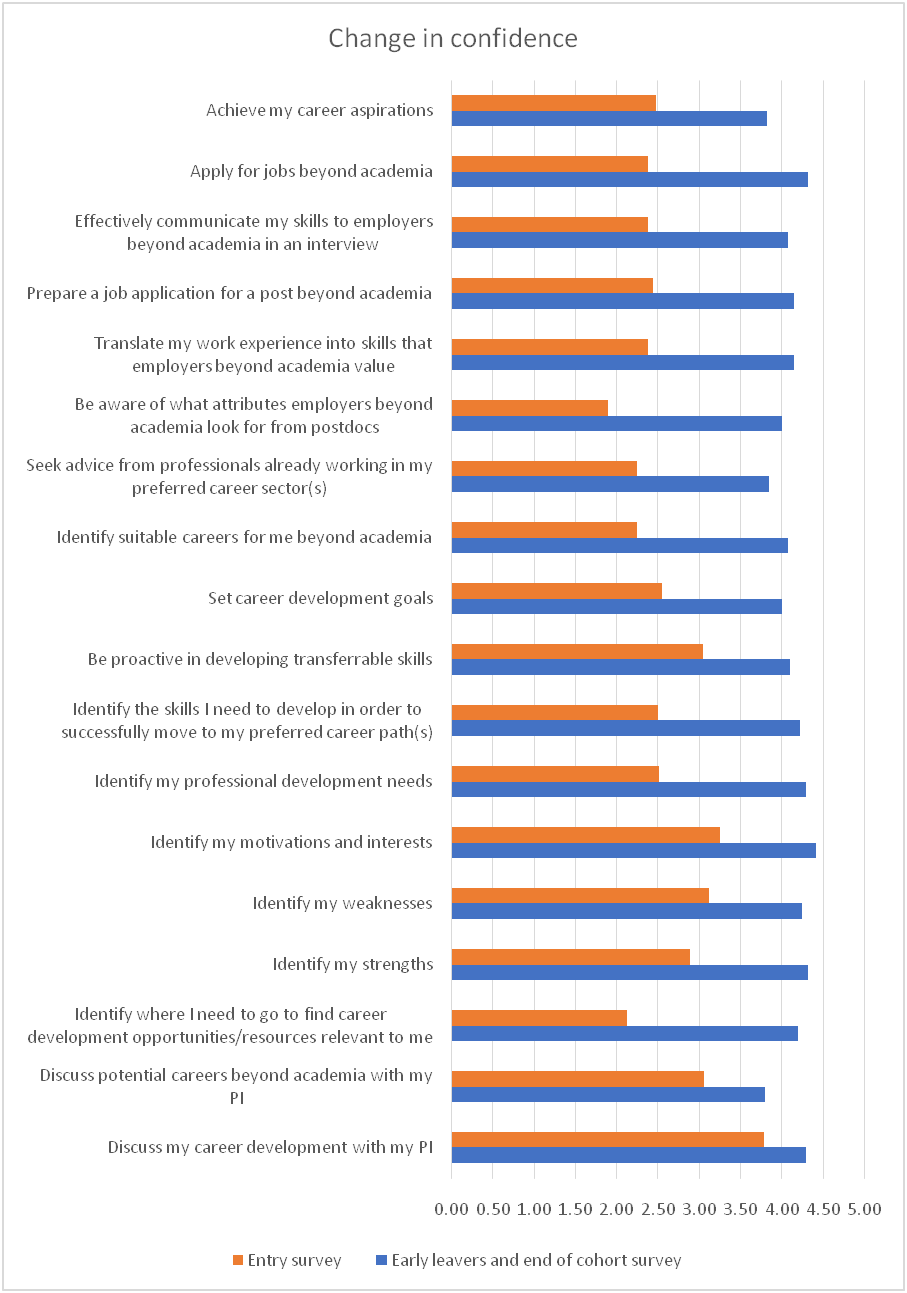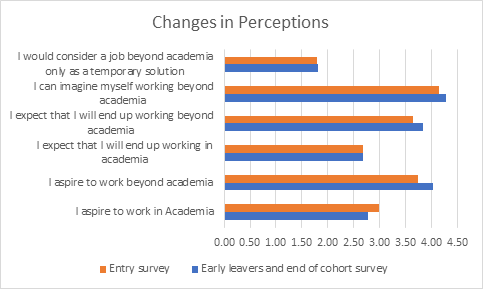Reflect, Explore, Act – An Evaluation of the First Prosper Pilot
Posted on: 12 October 2022 by James Reynolds and Dr. Anjali Thomas in Blog posts

As we publish our comprehensive evaluation of Prosper’s first career development pilot cohort, we take a look at some of the key findings, and explore the impact of the pilot on participants’ confidence, perceptions, aspirations and behaviours.
“Postdocs are some of the most able, committed and talented individuals you’ll find in today’s workplace. But too often they lack an appreciation of how skilled they truly are, and the extent to which time spent as a postdoc represents a fantastic investment for the future – one that can open all sorts of doors. In relation to this, the findings from the first Prosper pilot are hugely encouraging. It goes to show just how much of a difference it can make when postdocs are given the support they need to take control of their careers.”
Anthony Hollander, Pro-Vice-Chancellor for Research & Impact at The University of Liverpool.
The first Prosper career development pilot came to a close back in March. Since then – as well as getting underway with our second pilot – we’ve been collating feedback and crunching the numbers in order to produce a comprehensive evaluation of the impact of the first cohort.
When 53 postdocs from The University of Liverpool joined us for the start of the pilot in March 2021, we endeavoured to turn this group into a mini-community, with whom we co-created a broad offering designed to meet their career development needs as a whole. This offering included career coaching, engagement with and exposure to employers across 12 broadly defined career clusters, and a variety of workshops, sessions, and asynchronous resources. At every turn the cohort was encouraged to engage with Prosper as a group, and to network and share amongst themselves.
From the very start through to the end of participants’ engagement with Prosper, we sought to measure and track the impact the pilot had on participants’ confidence and aspirations, as well as behaviours and outcomes, relating to their career development and future plans – both as a whole and in terms of the pilot’s individual components.
This evaluation was informed by quantitative and qualitative data gathered over the course of the year. This included surveys, participation and engagement statistics, focus groups, and journal entries participants were encouraged to write to document their experiences and progress along the way. Some of the data below and in the report (where indicated) refers to data taken from exit surveys, which were completed by 42 of the 53 (~79%) members of the cohort.
We are delighted to now be able to publish the findings from this evaluation, which can be read in full detail here: An Evaluation of the First Prosper Career Development Pilot
Before we delve into some of the findings in greater depth, here are the headlines:
- Participants showed a marked and statistically significant improvement in confidence across 16/18 variables relating to various aspects of their ability to actively pursue and plan career development opportunities both within and beyond academia
- Participants additionally showed a notable increase in open-mindedness toward non-academic career pathways. The proportion aspiring to remain within academia – high at the start of the pilot - fell, while the proportion aspiring (and expecting) to one day transition beyond academia rose.
- These changes in confidence and perception translated to measurable shifts in behaviour relating to career development – a large majority (69%) of those polled in our exit surveys engaged with employers beyond academia outside of the confines of Prosper itself, within the timeframe of the pilot. Almost 60% applied for new roles both within and beyond academia, with around 30% solely applying for position beyond academia.
- At the time of writing this blog, almost half of the first cohort (25 out of 53) have secured new positions both within and beyond academia, with 16 (over 30% of the cohort) having successfully made the leap into career pathways beyond academia.
Confidence and Mindset
One of Prosper’s key objectives is to improve postdocs’ confidence regarding their ability to reflect upon and actively pursue their career development – to enable postdocs to take control of their future and switch from a passive and uncertain mindset to one characterised by pro-activity and clarity.
Members of the first cohort were asked to rate their confidence on a five-point Likert scale score between 1 (not at all confident) to 5 (completely confident) for 18 statements relating to various aspects of career development, at both the start and end of the engagement with Prosper, and at key junctures in-between. Over the course of the pilot, participants showed a marked and statistically significant improvement in their confidence levels across 16 of the 18 variables:

The most dramatic improvements were observed in relation to members’ confidence in their ability to self-reflect, actively pursue and plan their career development, transform and translate their skills according to what employers look for, identify opportunities beyond academia, and develop job applications.
Perceptions and Aspirations
Another key objective of Prosper is to broaden postdocs’ horizons in terms of awareness of and interest in career opportunities beyond academia – to furnish postdocs with a greater appreciation of the range of possibilities and options open to candidates with their skillset and background.
As with the confidence variables, we asked members of the cohort to record their aspirations and perceptions regarding what they envisaged for the future of their careers, and tracked these variables over the course of their engagement with Prosper:

The findings show that participants became more open-minded to non-academic career pathways as the year went on. The number of postdocs that solely aspired to remain in academia declined, while conversely the number aspiring to one day work beyond academia increased – as did the proportion of postdocs concretely expecting to make the transition at some future point in their career.
Behaviour and active career development
These changes in confidence and perception translated into a measurable shift in behaviours relating to career development. Away from transforming mindsets, one of Prosper’s more outcome-focused objectives is to encourage and enable postdocs to more actively pursue career opportunities by engaging with a wider range of employers beyond academia – not just through job applications themselves but also through professional networking and informational interviews.
We found that 69% of those polled in our exit surveys had used what they had learned to actively seek out and engage employers beyond the confines of Prosper itself. ~60% went so far as to apply for roles both within and beyond academia over the timeframe of the pilot, with one third solely applying for positions beyond academia.
Career outcomes
Perhaps the best measure of the pilot’s impact can be seen in the numbers that were able to parlay their newfound confidence, skills and career clarity into securing new roles. In terms of this measure, it is still, of course, early days. We don’t expect the full impact to materialise here until a couple of years following the conclusion of the pilot. Many of the participant postdocs will still be weighing up their options, pursuing opportunities, or completing current contracts. Nonetheless, the early numbers have exceeded our expectations.
17 of the 42 postdocs polled in our exit surveys had secured new jobs within the timeframe of the pilot – seven within academia, and 10 beyond academia. Since the end of the pilot (and not included in the report), two more have secured roles within academia, and six more beyond. This means that, at the time of writing, almost half of the first cohort (25) have secured new positions, with 16 (over 30% of the cohort) having made the leap into career pathways beyond academia.
These cohort members have gone onto secure roles at a wide variety of employers, including the Met Office, the European Commission, the Civil Service, software companies, pharmaceutical companies, and a handful of promising start-ups. Several have gone onto build their own businesses, with one having already secured a major contract to develop software for American labs to help with managing their samples. The range of roles secured is itself testament to the richness of talent and skill in our postdoc community, and how attractive postdocs – with the right career development support - can be as candidates to all manner of organisations. More detailed information chronicling the Prosper journeys of individual cohort members can be found via our case studies here.
Prosper is about helping postdocs appreciate their skills, the options available to them, and enabling them to take a more active and planned approach to their future career development and choices.
The aim is to give postdocs the space to make a more informed choice and indeed, several members of the first cohort, after engaging with Prosper, decided that the traditional academic pathway was right for them, and indeed what they wanted to aim for in the long run. But they do so now with extra clarity and foresight, and with added benefit of skills which are equally useful in the pursuit of an academic career pathway. Other cohort members indicated a desire to pursue academic roles for now but will benefit from a greater understanding of the wider landscape should they wish to make a transition at a future juncture, as well as a better appreciation of the value of the skills they are accumulating in their experience as postdocs. The point, whatever the chosen direction of travel, is that postdocs deserve the career development resources they need to take control of the futures.
It is worth making a final point about the limitations we encountered in analysing the data from the first cohort. While our cohort was recruited to represent a breadth of representation by gender, ethnicity and discipline, the numbers involved in the sub-groups were too small to allow for rigorous statistical conclusions to be drawn. We are of course now underway with our second pilot, involving a larger cohort of 75 postdocs drawn from the University of Liverpool, the University of Manchester, and Lancaster University, carefully selected to ensure a diversity that represents the wider UK postdoc community. Many of our learnings from the first cohort have played a key role in informing the structure and contents of the second, and the larger set of evaluative data from both cohorts combined will allow for a more meaningful breakdown of the impact according to different disciplines and participant backgrounds.
All of this is ultimately, of course, in service of the creation of our Prosper approach and associated Prosper portal, for our national, sector-wide rollout in the summer of next year. This will contain all the resources and sessions made available to the two cohorts, as well as extra materials and resources for institutions to enable organisations to implement Prosper in a way that suits their own budgets and needs. If you’d be interested in learning more about how Prosper could work for your institution, please don’t hesitate to get in touch. We hope this evaluation of the first cohort, along with the case studies and other materials, go some way to evidencing the benefits of the Prosper approach, as well as underlining the importance of postdoc career development support more broadly.
Keywords: Postdoc, Prosper, Evaluation, Postdoctoral researcher.